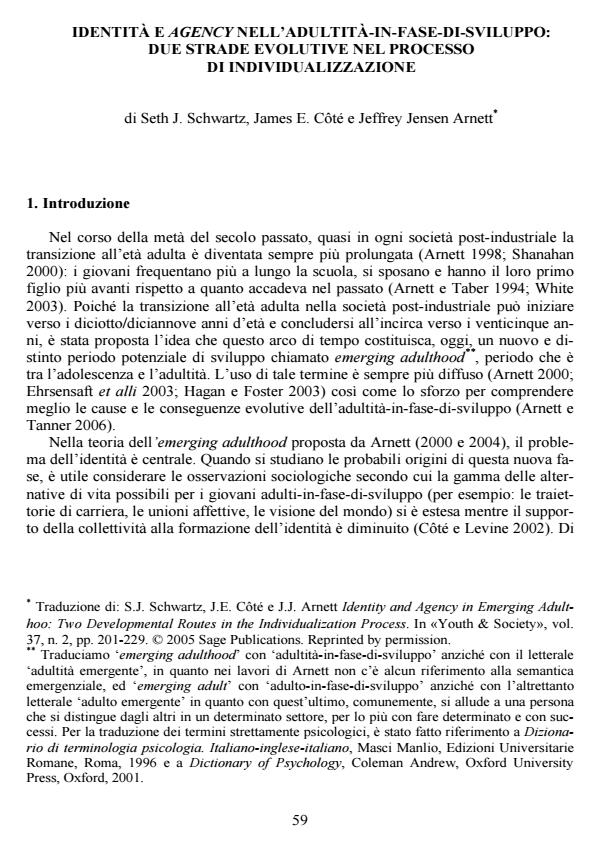Identità e "agency" nell'emerging adulthood: due strade evolutive nel processo di individualizzazione
Journal title SOCIOLOGIA E POLITICHE SOCIALI
Author/s Seth J. Schwartz, James E. Coté, Jeffrey Jensen Arnett
Publishing Year 2007 Issue 2007/2
Language Italian Pages 18 P. 59-76 File size 138 KB
DOI
DOI is like a bar code for intellectual property: to have more infomation
click here
Below, you can see the article first page
If you want to buy this article in PDF format, you can do it, following the instructions to buy download credits

FrancoAngeli is member of Publishers International Linking Association, Inc (PILA), a not-for-profit association which run the CrossRef service enabling links to and from online scholarly content.
Identity and agency in emerging adulthood: two developmental routes in the individualization process ABSTRACT: The study of emerging adulthood the prolonged transition to adulthood extending into the 20s is a rapidly growing area of research. Although identity issues are prominent during this period, the role of personal agency and individualization in the identity formation process during these years is not well understood. In an attempt to better understand emerging adulthood as an opportunity for identity development, authors’ purpose is to investigate deeper the relationship of individualization and agency to identity formation in emerging adulthood. In particularly, since the ethnic diversity in the United States of America is increasing day by day, the authors purpose to investigate the consistency of the agency-identity relationship across three American ethnic groups as well as to empirically evaluate two opposing developmental routes that takes place during the individualisation process. This study examines three psychological aspects of identity formation (style, status, and process) in relation to personal agency associated with the individualization process. Structural equation modelling analyses suggest that higher levels of agency are positively related to exploration and flexible commitment, unrelated to conformity, and negatively related to avoidance. Cluster analysis was used to examine and support a theorized polarity between developmental and default forms of individualization. Replicated across three U.S. ethnic groups, the results suggest that emerging adults utilize agentic capacities to varying degrees, and that the degree of agency utilized is directly related to the coherence of the emerging adult’s identity. The sample has been recruited from undergraduate courses at a public, urban multicultural university designated as a Minority Postsecondary Institution by the U.S. Department of Education.
Seth J. Schwartz, James E. Coté, Jeffrey Jensen Arnett, Identità e "agency" nell'emerging adulthood: due strade evolutive nel processo di individualizzazione in "SOCIOLOGIA E POLITICHE SOCIALI" 2/2007, pp 59-76, DOI: